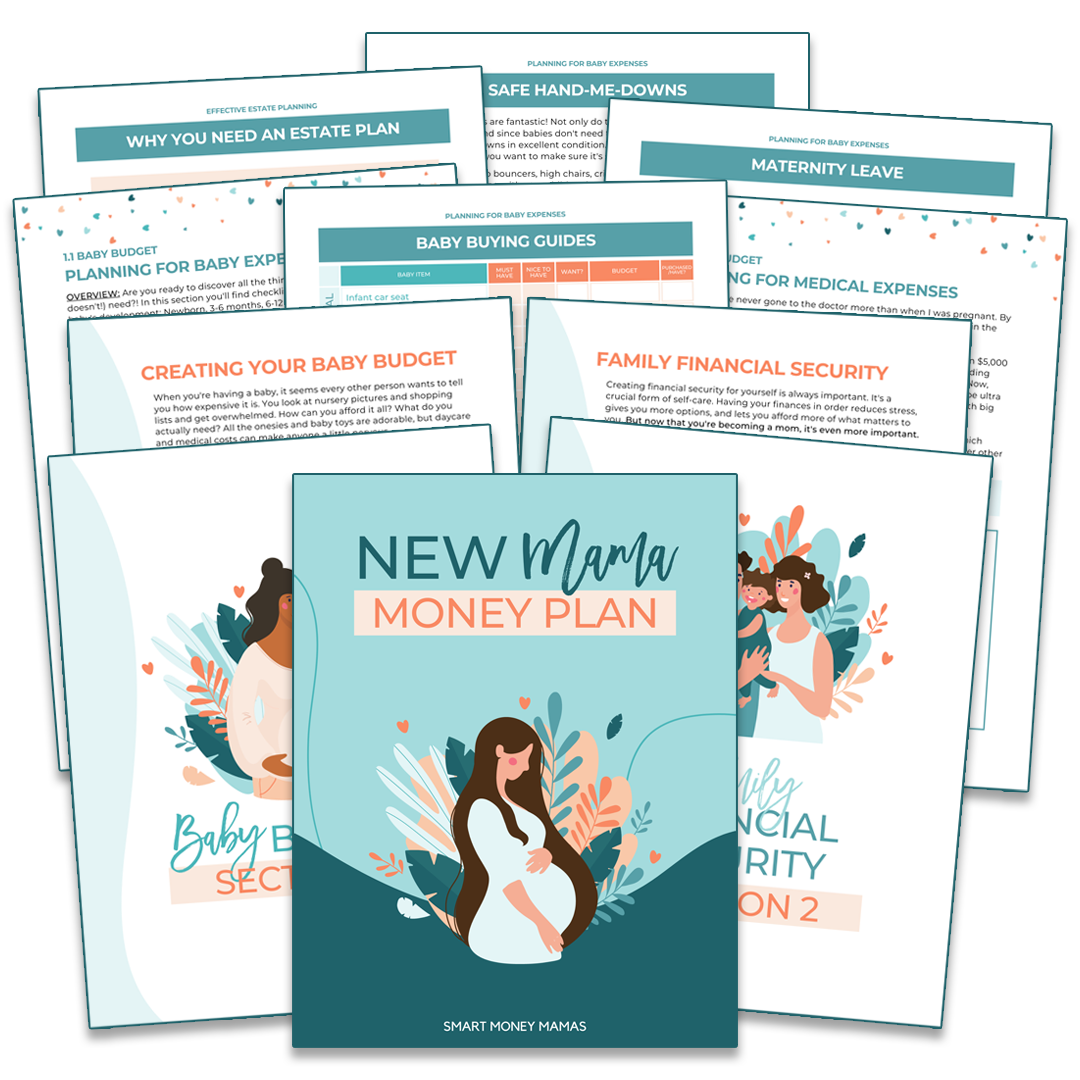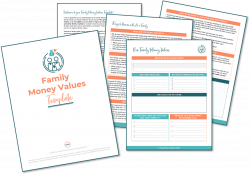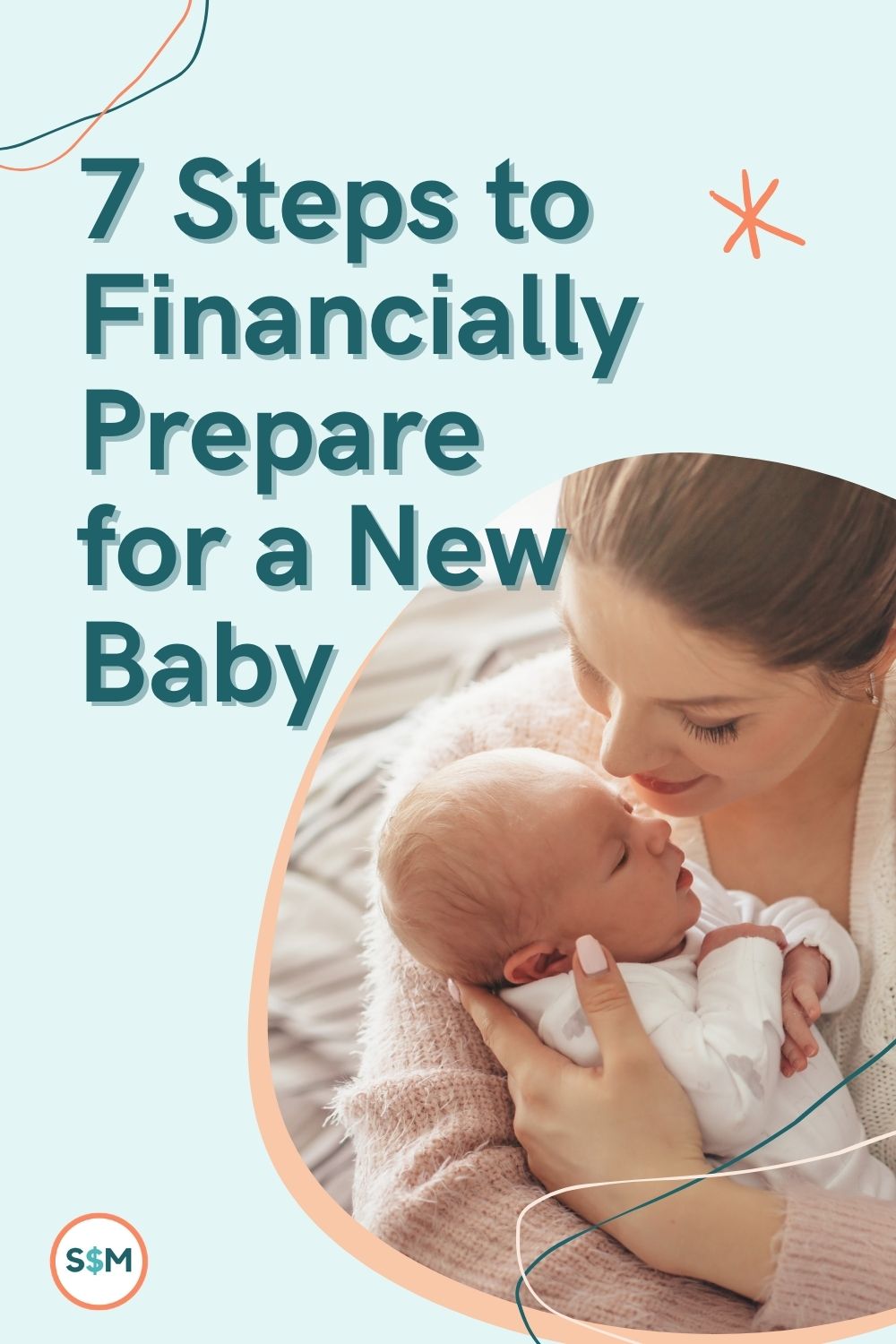Preparing for a new baby is incredibly exciting! But amid all the joy of your growing family and adorable tiny clothes, a new baby can be a major shock to your financial system.
But your little one doesn’t have to overwhelm your finances. And we’re here with seven steps to help you prepare for the financial challenges of growing your family.
How to Financially Prepare for a New Baby
 When you’re adding a new little person to your family, there are a number of steps you can take to make your money life less stressful. In our New Mama Money Plan, we help you create a one-year budget and spending plan incorporating all of you and your baby’s needs as well as create family financial security.
When you’re adding a new little person to your family, there are a number of steps you can take to make your money life less stressful. In our New Mama Money Plan, we help you create a one-year budget and spending plan incorporating all of you and your baby’s needs as well as create family financial security.
Here’s what you need to consider.
1 – Know Where You Stand Financially
This first step is the most important—you must know where you stand financially. Now, it’s important that you’re not afraid of these numbers.
Many mamas focus on the big picture and feel instantly overwhelmed. They think they won’t be able to afford a baby because they have so much debt.
But that isn’t what this is about.
Instead, it’s time to get honest about your numbers. Start by asking yourself:
- How much money do I spend each month?
- How much debt do I have?
- What type of debt do I have? Is it high-interest credit card debt or student debt I can manage?
- Am I living paycheck-to-paycheck?
- Do I have an emergency fund or other financial cushion?
Ask yourself each question and answer honestly. You’re not judging yourself or your finances. You’re simply taking stock of where you’re at so you can make a new mama money plan.
2 – Prepare for Baby Expenses
When reading parenting books and articles, you’ll notice each has a long list of items you and your baby can’t live without.
But here’s the thing: You don’t need all of those things.
Before you fork over the cash, take a minute to stop and get clear on your money and parenting values.
Are you a minimalist? Is it important that your home is not an overwhelming place? If that sounds like you, too much “baby stuff” will cause stress and leave you with little money leftover.
You can also consider what items are best to buy secondhand and what you should buy brand new.
Don’t forget to think about childcare, too. The waiting list for some daycares is incredibly long, so you’ll likely need to do this sooner rather than later.
What Are Your Family Money Values?

Grab our free Family Money Values Template and create a strong foundation for your family’s healthy money habits!
3 – Understand Medical Expenses
The average out-of-pocket cost of a delivery is between $5,000 and $11,000. So, talk to your doctor, hospital, and insurance company to find out what it might cost for you.
As you determine your medical expenses, consider:
- Your insurance deductible
- Your baby’s separate deductible after the first 30 days
- Your co-insurance costs
Also, keep in mind that medical expenses don’t stop after you deliver your baby. You may need lactation consultants, mental health care for postpartum depression, or other physical issues that result from giving birth.
4 – Consider Your Maternity Leave
If you’re a career mom, the last thing you want to do is rush back to work after having a baby. But 25% of moms go back to work out of financial necessity after only two weeks.
That’s why it’s essential to plan ahead—you can create a financial plan that allows you time at home with your new bundle of joy.
Start by talking to your employer. What type of leave do they offer? Is it paid? Can you save up sick days to cover more time off before returning to work after maternity leave?
Don’t forget that FMLA (the Family Medical Leave Act) can provide 12 weeks of protected job leave. That means your employer can’t fire you for taking time off after having a baby.
Now might also be an excellent time to transition into working from home doing your side hustle as a new mom. If you go that route, make sure you have backup childcare while you work on your business.
5 – Save an Emergency Fund
Part of becoming a parent is making sure your family is financially safe. After all, you don’t know what your life will look like once your baby arrives. What if you have unexpected expenses? What will you do?
Fortunately, that’s where an emergency fund comes in. If you don’t have one, start your emergency fund by saving the equivalent of one month’s expenses. Then, work your way up to setting aside enough money to cover costs for three to six months.
An important part of your emergency savings is to keep it separate from your regular spending account, so you don’t accidentally spend it. (“Mom brain” is real, and crazier things have happened!)
6 – Secure Proper Life Insurance
Life insurance is the last thing you want to think about as you’re bringing a new life into the world. But it’s so important.
Even stay-at-home moms need life insurance—it’s an excellent way to make sure your family is stable and secure, no matter what happens.
Term life insurance is the most affordable option, especially for young couples. If you’re getting a policy while pregnant, don’t wait. Your pregnancy could cause high blood pressure or gestational diabetes that can affect your approval and premiums.
Some insurance companies even use your current weight. So, if you’re far along in your pregnancy, your rates could be significantly higher.
7 – Create an Estate Plan
Wills and trusts are for everyone. Think about this: Do you want to have a say in who takes care of your child if you died prematurely? Obviously, the answer is yes. And an estate plan can help.
You can also include a family emergency binder in your estate plan. Your binder can give a trusted person the information needed to handle your finances in your absence, including where to find your will and how to access your bank accounts.
Preparing for a New Baby: The Bottom Line
When growing your family, the more solid your financial plan, the easier it will be to transition to this new way of life. Use your nesting energy for things like creating a financial plan, an emergency binder, and estate planning.
Preparing financially for your new baby is a much better use of your energy and money than stocking up on diapers and other items you may not need right away.
What money moves are you making for your growing family?

The post 7 Steps to Financially Prepare for a New Baby appeared first on Smart Money Mamas.
